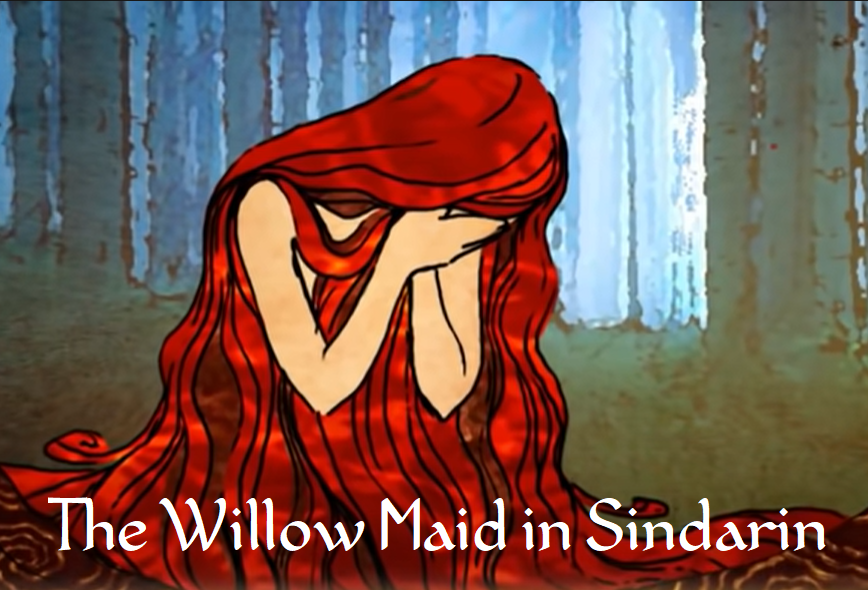
Listen to the original song The Willow Maid
Original song by Kate Covington AKA Erutan
Translation into Sindarin by Fiona Jallings
Dîr ‘wain padras drî i dawar
na *philinn în a gû farad.
Lastas neth ‘wain linnol
ar aphadas i lind athan.
Ennas *ichir i ‘wend
i dhortha ned i dathar.
Agon athen n’i lastas
od ringorn hwaind gerain,
“Aphado nin, Gwend;
Tolo uin chaust dathren gîn.”
den egin nan i thîr *bell în
ar îr agor ablad.
“Tiro nin: glîn ereb calad vin *rolilt.
Tiro nin: ú-venin uin had hen.
Lasto nin: lhoss lind ned in eryn.
*Law gano nin: len aphadad.”
Dîr ‘wain padras drî i dawar
na loth a goll galen.
I velethril dîn aw find hui naur;
I chent dîn aw ‘lîn galen.
Gwaedant im na meinas,
Dae ‘wain a dhae *bell.
*Ador ennas nuin dathar,
ar aun i loth valen athen.
“Gwend annel i veleth nîn,
A nidhin *oled i naer lîn.”
Ebent ava de *mestad,
al-*nevui, al-chae, egor al-fair.
“Tiro nin: glîn ereb calad vin *rolilt.
Tiro nin: a ú-venin uin had hen.
Lasto nin: lhoss lind ned in eryn.
*Law gano nin: len aphadad.”
Dîr ‘wain padras drî i dawar
na chathol vaeg hui higil.
“Nidhin mabed i edhel laecheneb,
a dôl *oled i vess nîn.
*Sa den nidhin galad i chîn nîn.
*Sa den nidhin cuiad.”
I ‘wend *níniast n’i de lastant,
n’i ebent i nîdh de leged.
Avamp i chathol în a de maethant
an chastad i ‘aladh iaur dîn.
“Sîr i dathar lîn dannen.
Sîr le ñerin.”
“Tiro nin: glîn ereb calad vin *rolilt.
Tiro nin: a ú-venin uin had hen.
Lasto nin: lhoss lind ned in eryn.
*Law gano nin: len aphadad.”
Den aphadant ed i dawar, ar dannast na Geven.
I dail dîn padrast *annas ginnog,
uin dôr galen en-onnad dîn.
Ifir ar *ûl loth,
I *lostas am min aduial ‘ail.
Ú-avamp uin dawar,
ha i *law ninnen mened.
Literal Translation back into English
A young man walked through the forest
with his arrows and hunting bow.
He heard a young girl singing
and he followed the song beyond.
There he found the maiden
who lives in the willow.
He called to her when she listened
from a circle of red mushrooms,
“Follow me, Maiden;
Come from your willow bed.”
She saw him with her tranquil face
and only gave refusal.
“See me: a lonely ray of light in the moondance.
See me: I cannot go from this place.
Hear me: a whisper of song in the trees.
Don’t command me: to follow you.”
A young man walked through the forest
with a flower and a green cloak.
His lover had hair like fire;
Her eyes had a green gleam.
she enfolded herself with beauty,
very young and very tranquil.
He stood there under the willow,
and he gave the golden flower to her.
“Maiden you caught my love,
Oh I will become your groom.”
She said she refuses to wed him,
not-near, not-far, or not-promptly.
“See me: a lonely ray of light in the moondance.
See me: I cannot go from this place.
Hear me: a whisper of song in the trees.
Don’t command me: to follow you.”
A young man walked through the forest
with a ax sharp like a knife,
“I will ask the green-eyed elf,
and she will become my wife.
With her I will raise my children.
With her I will live.”
The maiden wept when she heard him,
When he said that he will release her.
He held his ax and wielded it
to hack her ancient tree.
“Now your willow is fallen.
Now I own you.”
“See me: a lonely ray of light in the moondance.
See me: I cannot go from this place.
Hear me: a whisper of song in the trees.
Don’t command me: to follow you.”
She followed him out the forest, and fell to Earth.
Her feet walked a small distance,
from the green home of her birth.
She faded and became a flower,
that bloomed for one bright evening,
He couldn’t seize from the forest,
that which was not intended to go.
Fanmade Vocabulary (in order of appearance)
- Pilinn – arrow. Based on the Quenya word pilinde – arrow.
- Hir- to find. Based on the Quenya word hir- to find.
- Pell – tranquil, quiet. Based on the Qenya word quilda – tranquil, quiet, still.
- Rolilt – moondance. Compound of Raun – Moon and *lilt – dance. Dance is based on the ancient root LILT.
- Law – no, not. Based on the Quenya word lá of the same meaning.
- Tar- to stand. Based on the Quenya word tar- to stand.
- Ol- to become. Based on the Quenya word ol- to become.
- Besta- to wed. Based on the ancient root BES – to wed.
- Nevui – near. Compound word based on nef – on this side of and -ui adjective suffix.
- Sa – with. Based on the Ancient root ASA – beside.
- Nínia- to weep. Based on nîn – tear, and the ancient suffix JĀ.
- Losta- to bloom. Based on the Quenya word losta- to bloom.
- Annas – distance, length. Compound of and – long and the abstract noun suffix.
